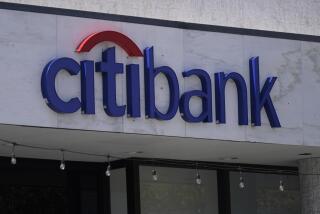U.S. sues Goldman Sachs in credit union failures
Federal regulators hit Goldman Sachs Group Inc. with a $491-million lawsuit, the fourth in a series of planned legal assaults on financial firms that marketed mortgage securities to large credit unions.
The suit, filed Tuesday in U.S. District Court in Los Angeles, accused the Wall Street firm of making misleading written and oral statements about the soundness of the securities, which were purchased by the now-failed U.S. Central and San Dimas-based Western Corporate federal credit unions.
Shocks from the mortgage meltdown and financial crisis caused five wholesale credit unions to fail, and the National Credit Union Administration is now suing to recoup some of the losses on $50 billion worth of bonds that plunged in value. The retail credit unions are having to cover the losses of the wholesale credit unions.
“Those who caused the problems in the wholesale credit unions should pay for the losses,” National Credit Union Administration Board Chairman Debbie Matz said in announcing the latest lawsuit.
Goldman Sachs spokesman Stephen Cohen declined to comment.
The other defendants so far are the Royal Bank of Scotland and JPMorgan Chase & Co., with the NCUA seeking a total of about $2 billion in damages. In all, about 10 such suits are in the pipeline, a spokesman for the federal credit union regulator said.
U.S. Central and Western Corporate are so-called wholesale credit unions, which handle transaction processing and investments for smaller retail credit unions that deal directly with the public. The NCUA took them over in March 2009, saying their portfolios of mortgage securities presented “an unacceptably high” concentration of risk.
U.S. Central lost about $1.5 billion, according to the NCUA’s Office of Inspector General, and Western Corporate lost nearly $5.6 billion.
The lawsuits illustrate how federal authorities, largely stymied in attempts to mount major criminal prosecutions related to the mortgage crisis, are targeting financial firms and their executives in civil lawsuits. Many banks also are facing private claims related to mortgage securities, such as a $10-billion lawsuit that insurer American International Group filed Monday against Bank of America Corp.
Among the federal agencies pursuing this course is the U.S. attorney’s office in Manhattan, which is seeking $1 billion from Deutsche Bank, Germany’s largest bank, related to mortgages backed by the Federal Housing Administration.
Another example is the Federal Deposit Insurance Corp., which is demanding that former officers of Washington Mutual, IndyMac and other failed banks cough up hundreds of millions of dollars to cover losses to the nation’s deposit insurance fund.
The securities mentioned in the credit union lawsuit Tuesday, backed by pools of home loans issued during the housing boom, were nearly all categorized as AAA, the highest possible credit rating. Their holders were supposed to be paid before investors holding lower-rated bonds, but they sustained huge losses despite that guarantee.
The National Credit Union Administration suit blamed much of the trouble on Goldman and the originators of the mortgage bonds, including Fremont Home Loan, GreenPoint Mortgage and Long Beach Mortgage. The originators “had systematically abandoned the stated underwriting guidelines” that were described in the documents offering the securities for sale, the NCUA lawsuit said.
A “material percentage” of the borrowers were in such bad financial shape that their mortgages “were all but certain to become delinquent or default shortly after origination,” the suit said. As a result, it contended, the mortgage bonds “were destined from inception to perform poorly.”
The suit did not accuse Goldman Sachs of fraud but said it “is liable for material untrue statements and omissions of fact” under federal and state securities laws.
The suit accuses Goldman Sachs of violating Section 11 of the Securities Act of 1933, which, according to Columbia University securities law professor John C. Coffee Jr., “has probably the most pro-plaintiff balance of advantage of any legislation in federal law.”
The statute makes Goldman, as the underwriter of the investments, liable for misrepresentations in the registration statements and prospectuses “unless it can demonstrate that it conducted adequate due diligence to verify the truth of the statements,” Coffee said.
Under other sections of federal law, a defendant would have to be shown to have intended to defraud the purchaser.






